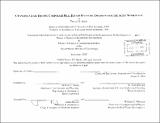Changing gear : driving corporate real estate financing decisions for the agile workplace
Author(s)
Hardy, Trevor J. F. (Trevor John Fraser), 1977-
DownloadFull printable version (20.39Mb)
Other Contributors
Massachusetts Institute of Technology. Dept. of Urban Studies and Planning.
Advisor
W. Tod McGrath.
Terms of use
Metadata
Show full item recordAbstract
Given the needs of corporations in the global business environment, corporate real estate investment decisions represent strategic choices that support a company's overall business strategy. This thesis clearly illustrates that, contrary to the Modigliani Miller theorem, companies do face real trade-offs in deciding how they finance their real estate investments. Notwithstanding the need to customize decisions on behalf of the business unit customers and to ensure that these choices are economically sound within a given region, there are significant factors that drive real estate decision makers to make a particular financing decision. By analyzing these factors in relation to the financing alternatives available a comprehensive framework of decision drivers is developed to aid eRE managers in gathering relevant information in order to evaluate the overall effectiveness and trade-offs associated ,with each alternative. Through a series of case studies it is then shown that financing decisions which optimize the real estate portfolio 1) clearly reflect the financial and operational requirements of both the company and business units; 2) are very much part of a larger portfolio wide corporate real estate strategy, which is closely allied to the company's overall corporate strategy; 3) take into account the perspectives of other role players (IT,HR, Finance) in the decision making process.
Description
Thesis (S.M.)--Massachusetts Institute of Technology, Dept. of Architecture; and, (S.M.)--Massachusetts Institute of Technology, Dept. of Urban Studies and Planning, 2002. Includes bibliographical references (p. 138-142).
Date issued
2002Department
Massachusetts Institute of Technology. Department of Architecture; Massachusetts Institute of Technology. Department of Urban Studies and PlanningPublisher
Massachusetts Institute of Technology
Keywords
Architecture., Urban Studies and Planning.